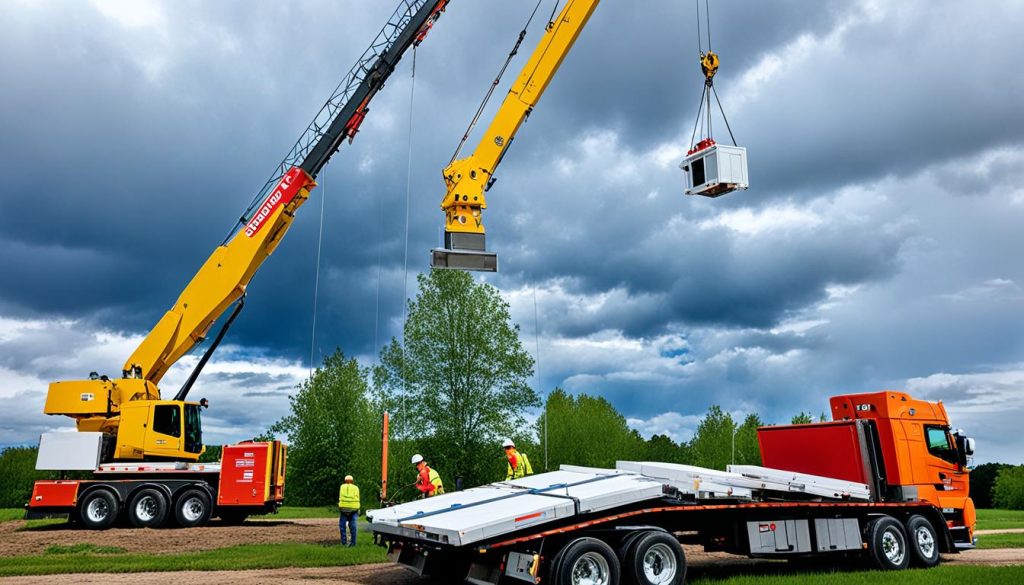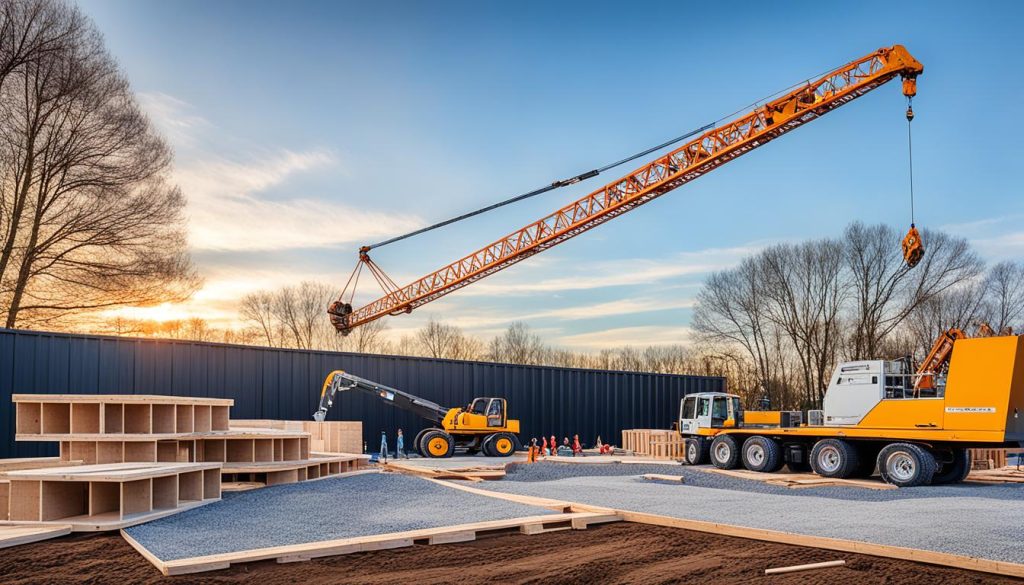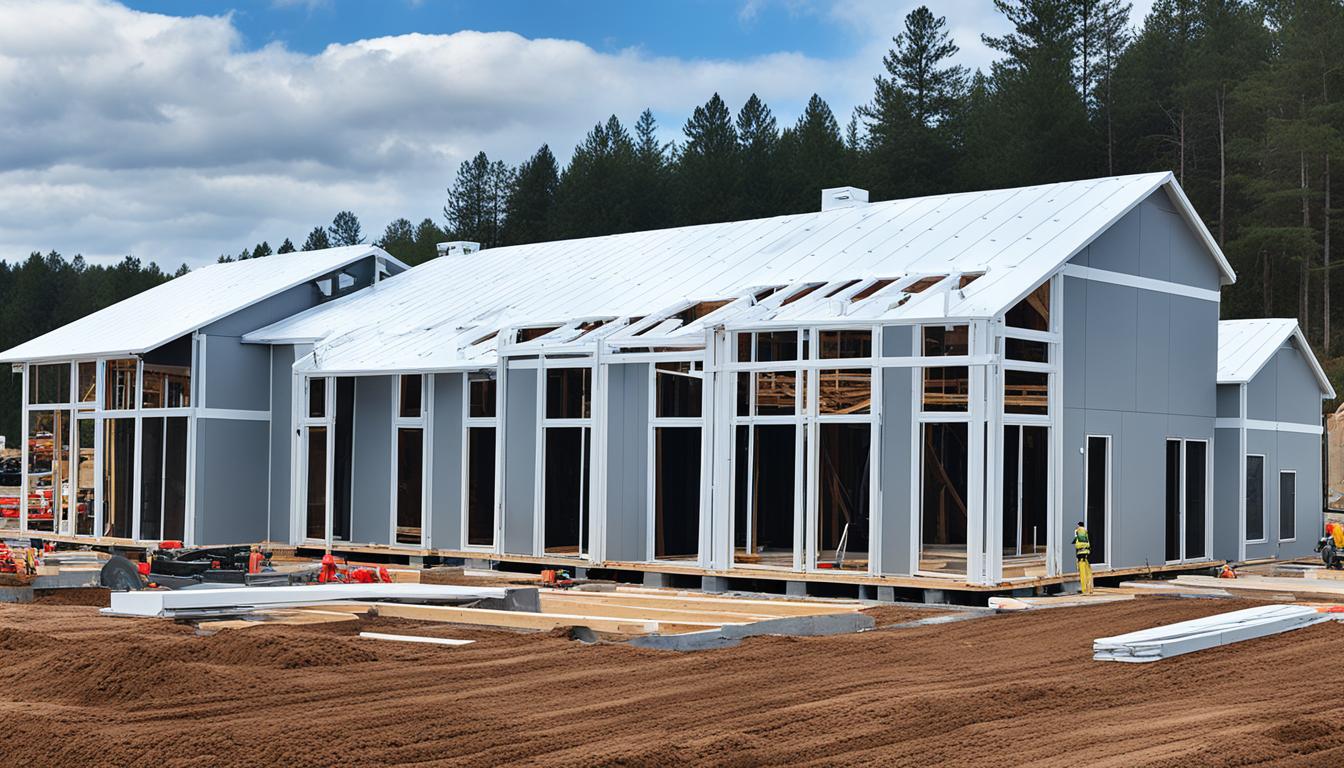Did you know that building a modular home can take as little as 16-22 weeks from start to finish? That’s right! In just a matter of months, you can have a fully constructed and move-in ready modular home. But how does this process unfold? Let’s explore the timeline and key phases involved in constructing a modular home.
Key Takeaways
- Building a modular home typically takes 16-22 weeks from start to finish.
- The construction process includes a factory building phase and an on-site building phase.
- External factors such as planning permits, site preparation, and finance can impact the overall project timeline.
- Modular construction is faster than traditional construction, with additional advantages in terms of cost-effectiveness and efficiency.
- Pre-approval for financing and selecting pre-built modular homes can speed up the construction process.
Factory Building Phase
The factory building phase is an essential part of the modular home construction process, where the actual fabrication of the home takes place in a controlled manufacturing facility. During this phase, my team of experienced builders and qualified tradespeople work diligently to construct the modular home to around 90% completion.
This phase typically takes between 8-12 weeks, although the exact duration may vary depending on the size and complexity of the home, as well as any customizations requested by the client. It is during this phase that the modular home manufacturing facility becomes a hub of activity, with every detail meticulously attended to.
Throughout the factory building phase, careful quality control measures are implemented to ensure that each module meets the highest standards of craftsmanship and structural integrity. This attention to detail helps guarantee that the finished home not only meets but exceeds the expectations of our clients.
Once the modules are complete, they undergo thorough inspections and testing to ensure everything is in order. Then, the modules are carefully loaded onto transportation vehicles, ready to be transported to the site where the home will be installed. This transportation process is orchestrated with precision, taking into consideration factors such as the size and weight of the modules, as well as the distance they need to travel.
Factory Building Phase Summary
| Phase | Duration |
|---|---|
| Factory Building Phase | 8-12 weeks |
On-Site Building Phase
The on-site building phase of constructing a modular home is a crucial step in bringing the home to completion. During this phase, the modules that were built in the manufacturing facility are transported to the land where the home will be installed. This phase involves various tasks that contribute to the final touches and readiness of the home for occupancy.
Firstly, the modules are carefully joined together to create a seamless structure. This process ensures that the home is secure and stable, providing a solid foundation for the rest of the construction. Once the modules are successfully joined, the installation of sub-floor cladding is carried out. The sub-floor cladding provides insulation and protection, enhancing the overall durability of the home.
Another crucial aspect of the on-site building phase is the connection of town services. This includes hooking up power, water, and sewerage systems to ensure that the home is fully functional and ready for living. The proper installation of these services is essential for the home to meet all necessary requirements and provide a comfortable living experience.
In addition to the essential tasks of joining modules and connecting services, the on-site building phase allows for the incorporation of optional extras. This is the opportunity to add those finishing touches that enhance the functionality, aesthetics, and comfort of the home. Optional extras can include features such as decking, air-conditioning, or other customized elements that cater to the specific preferences and needs of the homeowner.

Overall, the on-site building phase of constructing a modular home takes around 8-10 weeks to complete. During this time, the modules are transformed into a fully functional and aesthetically pleasing home. The attention to detail and careful execution during this phase ensure that the prefab home reaches its maximum potential, ready to provide a comfortable and enjoyable living space.
| Tasks | Estimated Time |
|---|---|
| Joining modules | 2-3 weeks |
| Sub-floor cladding installation | 1-2 weeks |
| Connection of town services | 2-3 weeks |
| Optional extras | 1-2 weeks |
Pre-Construction Phase
During the pre-construction phase of building a modular home, careful design and planning take place to ensure a successful project. This phase is crucial as it sets the foundation for the entire construction process.
First, the home is designed and drafted according to the client’s specifications. This includes determining the layout, selecting materials, and finalizing the overall aesthetic. It’s important to collaborate closely with the client during this stage to ensure their vision is accurately captured.
Next, site engineering reports are prepared to assess the feasibility and suitability of the chosen location. These reports consider factors such as soil analysis, drainage, and environmental impacts.
Energy ratings are also taken into account during the pre-construction phase. By assessing the energy efficiency of the design, homeowners can make informed decisions to reduce their carbon footprint and lower utility costs.
Additionally, planning applications are submitted to obtain the necessary permits for the construction project. These permits ensure that the modular home meets local building codes and regulations.
Throughout the pre-construction phase, consultations are conducted to finalize the color and specification choices for the home. This allows homeowners to customize their modular home to their preferences.
Once the design, planning, permits, and consultations are complete, the pre-construction phase wraps up, and the construction phase can begin. The attention to detail and careful planning during this phase set the stage for a smooth and efficient modular home construction process.

External Factors Affecting Build Time
When it comes to building a modular home, there are several external factors that can influence the overall project timeline. These factors include obtaining planning permits, site preparation, and securing financing.
Planning Permits: The process of obtaining planning permits from the local council can take anywhere from 3 to 4 months. However, it’s important to note that delays may occur due to a backlog or increased demand. It’s advisable to apply for permits as early as possible to avoid any potential delays in the construction process.
Site Preparation: Site preparation plays a crucial role in the modular home construction process. This includes tasks such as land clearing, excavation, and utility connections. The time required for site preparation can vary depending on the complexity of the site and the specific requirements of the home. It’s essential to allocate sufficient time for these activities to ensure a smooth and efficient construction process.
Finance: Securing financing for a modular home may require a different approach compared to traditional home financing. The time taken to finalize the financing can impact the overall project timeline. It’s important to engage with financial institutions and explore the available options early on to streamline the financing process.
In order to minimize potential delays, it is recommended to start the planning and permit application processes well in advance. Collaborating closely with the local council, contractors, and financial institutions can help ensure a smoother and more efficient modular home construction process.
| External Factors | Impact |
|---|---|
| Planning Permits | 3-4 months, potential for delays |
| Site Preparation | Varies based on complexity and requirements |
| Finance | Time taken to finalize financing |
Modular vs. Traditional Construction Time Comparison
When it comes to constructing a home, the timeframe is an important factor to consider. For those looking for a quicker and more efficient building process, modular construction can be a great option. Compared to traditional construction methods, modular homes can be built much faster, saving you time and providing a faster move-in date.
Traditional construction methods typically take a year or more to complete a home. This timeline includes various stages such as site preparation, foundation construction, framing, interior work, and exterior finishing. On the other hand, modular construction offers a significantly shorter build time, with an average duration of 16-22 weeks.
The streamlined and efficient nature of modular construction is the key factor behind its faster build time. Modular homes are built off-site in a controlled factory environment, allowing for precise and efficient production. The construction process overlaps with site preparation, meaning that while the modules are being built in the factory, the necessary site work, such as land clearing and foundation preparation, can be completed simultaneously.
Once the modules are complete, they are transported to the site and assembled, significantly reducing the on-site construction time. The modular home can then be finished with the necessary interior and exterior touches, such as plumbing, electrical work, and finishing details.
Modular construction offers several advantages over traditional construction methods. In addition to the shorter build time, modular homes are often more cost-effective due to the controlled production environment and economies of scale. The factory-built components also tend to be of higher quality, as they are constructed in a controlled environment and undergo rigorous inspections.
Overall, the modular construction process is a faster, more efficient, and cost-effective alternative to traditional construction methods. Whether you’re looking to build a new home or expand your existing one, considering modular construction can help you save time and enjoy the benefits of a well-built, high-quality home.
Tips for a Faster Modular Home Construction Process
When it comes to speeding up the modular home construction process, there are a few key tips to keep in mind. Firstly, it is highly recommended to get preapproved for financing and ensure that all necessary documentation is ready to go. By having your financing in order from the start, you can avoid delays and keep the construction process on track.
Another way to reduce construction time is by selecting an available pre-built modular home from a local home center. These pre-built homes have already undergone the manufacturing process and are ready to be installed on your land. By choosing from the available options at a local home center, you can bypass the time-consuming design and manufacturing phases, allowing for a quicker construction process.
Working closely with the home center throughout the construction process is crucial for a smooth and efficient build. Stay in constant communication with the home center to stay updated on the progress of your modular home’s construction. This will help you address any issues or potential delays promptly, ensuring that your home is completed in a timely manner.
In summary, to speed up the modular home construction process, be proactive in securing financing, select an available pre-built home from a local home center, and maintain close communication with the home center throughout the build. By implementing these tips, you can enjoy a faster and more efficient construction process for your modular home.

Leave a Reply
You must be logged in to post a comment.